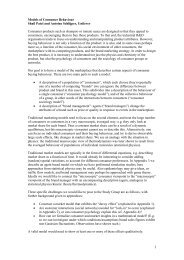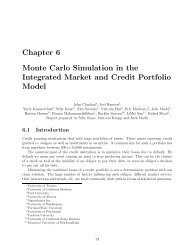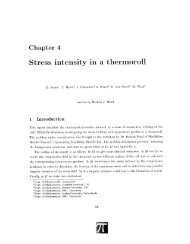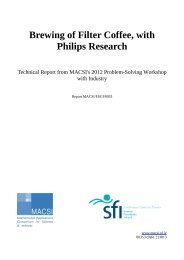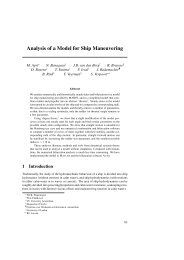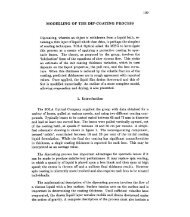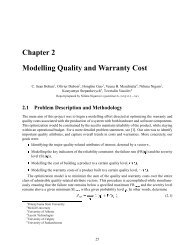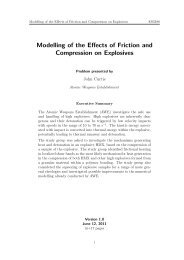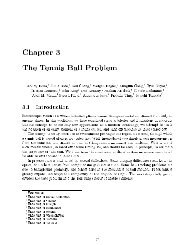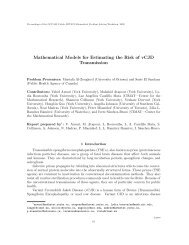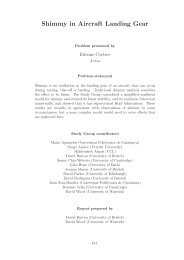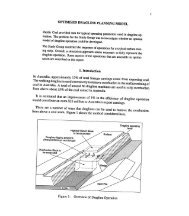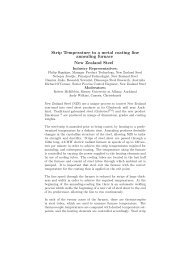Opening Address by Professor Ian Watson - Mathematics in Industry
Opening Address by Professor Ian Watson - Mathematics in Industry
Opening Address by Professor Ian Watson - Mathematics in Industry
Create successful ePaper yourself
Turn your PDF publications into a flip-book with our unique Google optimized e-Paper software.
Ref: UA 00 13 02 IDW/jc-3421<br />
“Mathematical Techniques For Industrial Problems”<br />
Re: <strong>Mathematics</strong> <strong>in</strong> <strong>Industry</strong> Workshop<br />
I.D.<strong>Watson</strong><br />
Pr<strong>in</strong>cipal Albany Campus Massey University<br />
Thank you for the <strong>in</strong>vitation to open the 20th Workshop on Industrial <strong>Mathematics</strong>,<br />
for Australasia, and the first of these to be held <strong>in</strong> New Zealand. May I firstly thank<br />
The University of Auckland for provid<strong>in</strong>g the venue, then acknowledge the passion<br />
and drive of <strong>Professor</strong> Graeme Wake and the organiz<strong>in</strong>g committee for mak<strong>in</strong>g it<br />
happen. Can I also acknowledge those who are attend<strong>in</strong>g today, on a public holiday<br />
at that. It says someth<strong>in</strong>g of your commitment that you are here, and thank you for<br />
that.<br />
Universities it is often said are ivory towers, and mathematicians are sometimes<br />
regarded as the epitome of those who <strong>in</strong>habit them. Thus the thought that<br />
mathematicians from universities might engage with potentially useful issues such as<br />
those thrown up <strong>by</strong> <strong>in</strong>dustry is, at first blush, qua<strong>in</strong>t. Indeed, <strong>in</strong> my own field of<br />
chemistry <strong>in</strong> the 1950s and 60s the more arcane the branch, especially if it happened<br />
to be practised at Oxford or Cambridge, the higher was its academic stand<strong>in</strong>g. What<br />
got lost <strong>in</strong> this Colonial transfer of prestige was the reality that the specific chemistry<br />
had very mundane orig<strong>in</strong>s. Thus the chemistry of what <strong>in</strong> my day was called natural<br />
products and had migrated to lofty academic heights was triggered near the start of the<br />
twentieth century <strong>by</strong> the drive for better chemical dyes, better explosives, and better<br />
pharmaceutical remedies. This dom<strong>in</strong>ance precluded the study of topics, which were<br />
just as chemically challeng<strong>in</strong>g, and of more practical value for New Zealand. To<br />
some extent that was remedied <strong>in</strong> the 1970s when a group of chemists and<br />
biochemists at Massey University chose to study prote<strong>in</strong> chemistry with a view to<br />
enhanc<strong>in</strong>g the meat, wool, and dairy <strong>in</strong>dustry. The result some thirty years later has<br />
been not only <strong>in</strong>creased value added to these <strong>in</strong>dustries but also effectively three<br />
Centres of Research Excellence, one at The University of Auckland which <strong>in</strong>cludes<br />
<strong>Professor</strong> Ted Baker (a prote<strong>in</strong> chemist) and <strong>Professor</strong> Peter Hunter (a biomedical<br />
eng<strong>in</strong>eer) and embraces molecular biodiversity, one at Victoria University of<br />
Well<strong>in</strong>gton headed <strong>by</strong> <strong>Professor</strong> Paul Callaghan, a fellow of the Royal Society of<br />
London which embraces new materials and nano technology, and one at Massey<br />
University which <strong>in</strong>volves the mathematician <strong>Professor</strong> Michael Hendy and embraces<br />
molecular evolution. So, today, <strong>in</strong> tackl<strong>in</strong>g real problems you are giv<strong>in</strong>g yourself the<br />
opportunity to break new mathematical ground and who knows, perhaps as a result a<br />
new centre of research excellence will be born!<br />
Over the vacation I have had the chance to read a series of essays on the use of<br />
mathematics <strong>in</strong> modern science. They have been edited <strong>by</strong> Grahame Farmelo, an<br />
Associate <strong>Professor</strong> of Physics at Northeastern University and have been published <strong>by</strong><br />
Granta under the title “It Must Be Beautiful” Great Equations of Modern Science. I
will not bore you with too much detail but they <strong>in</strong>clude essays on all the old favourites<br />
of theoretical physics, one on <strong>in</strong>formation theory, one on chemical reactions <strong>in</strong> the<br />
stratosphere, and two on population biology. One of those was <strong>by</strong> Lord May who<br />
made the po<strong>in</strong>t that from Newton until recently, the major mathematical tool used <strong>in</strong><br />
Science was differential equations. These he po<strong>in</strong>ted out, were particularly successful<br />
<strong>in</strong> theoretical physics because that discipl<strong>in</strong>e was capable of reduc<strong>in</strong>g itself to a few<br />
basics, all of which were amenable to such an approach. One has, of course, seen the<br />
power of these equations beyond that doma<strong>in</strong>, for example, <strong>in</strong> eng<strong>in</strong>eer<strong>in</strong>g and<br />
chemical bond<strong>in</strong>g and reactivity. I know, for <strong>in</strong>stance, someth<strong>in</strong>g of<br />
<strong>Professor</strong> Wake’s work on spontaneous equation of wool, and I am sure that they will<br />
be aga<strong>in</strong> to the fore today. But May’s essay notes that the algorithms devised to<br />
account for what has come to be called chaos theory are not of this doma<strong>in</strong> and, where<br />
change occurs <strong>in</strong> discrete jumps rather than smoothly, to use his terms, this has proved<br />
to be a better approach for certa<strong>in</strong> biological phenomenon such as predator-prey<br />
relationships. Incidentally, a chance meet<strong>in</strong>g and over-d<strong>in</strong>ner conversation with Dr<br />
Chris K<strong>in</strong>g, a mathematician at Auckland University, <strong>in</strong>troduced me to a possible way<br />
to look at chemical bond<strong>in</strong>g from a chaotic viewpo<strong>in</strong>t which seemed to have<br />
considerable merit when compared to the currently used differential equation<br />
approach of Wave Mechanics.<br />
The second essay <strong>in</strong>volv<strong>in</strong>g mathematics and biology was <strong>by</strong> John Maynard Smith,<br />
and was about the application of game theory to evolution. In that essay, Smith<br />
makes the po<strong>in</strong>t that <strong>in</strong> contrast to the physical world, the biological world consists of<br />
a host of complex events <strong>in</strong>capable of separation because of their <strong>in</strong>terdependence<br />
with respect to time and space. In such circumstances, he argues (though <strong>Professor</strong><br />
Hunter who has devised algorithms that simulate soft tissue behaviour and span<br />
several orders of magnitude with respect to time and space may not agree), that<br />
mathematics <strong>in</strong> biology can only provide a “big-picture view”. That said he shows<br />
that the mathematical technique he uses, can produce some far reach<strong>in</strong>g and very<br />
powerful <strong>in</strong>sights.<br />
The po<strong>in</strong>t I am try<strong>in</strong>g to make is that mathematicians have now designed an armory of<br />
techniques that have proved extraord<strong>in</strong>arily helpful <strong>in</strong> scientific areas. Just as we<br />
have seen that different approaches reveal different truths <strong>in</strong> the physical and<br />
biological worlds, so, we might expect the same as we move <strong>in</strong>to <strong>in</strong>dustry. So<br />
problems associated with manufactur<strong>in</strong>g, l<strong>in</strong><strong>in</strong>g up as they might, with problems <strong>in</strong><br />
eng<strong>in</strong>eer<strong>in</strong>g, might be first approached via differential equations. But problems<br />
associated with the bus<strong>in</strong>ess side of <strong>in</strong>dustry, f<strong>in</strong>ancial and human management, for<br />
<strong>in</strong>stance might require another. Thus, at the Albany Campus of Massey University,<br />
for <strong>in</strong>stance, the post-graduate F<strong>in</strong>ance papers are heavily dependent on our postgraduate<br />
statistic courses and make up the bulk of those large numbers of students.<br />
By way of contrast, there is little mathematics <strong>in</strong>volved <strong>in</strong> post-graduate management<br />
courses, and given that it conta<strong>in</strong>s complexities similar to the biological world <strong>in</strong> that<br />
it <strong>in</strong>volves large numbers of complex, time-dependent <strong>in</strong>teractions, one wonders<br />
whether game theory could provide useful <strong>in</strong>sights <strong>in</strong> this and other discipl<strong>in</strong>es that<br />
have a high social <strong>in</strong>teraction content. Auckland’s Vice-Chancellor Dr John Hood<br />
has rather controversially publicly lamented the absence of a world-class bus<strong>in</strong>ess<br />
college <strong>in</strong> New Zealand. Whether or not he is correct, I firmly believe that the first to
put all of there offer<strong>in</strong>gs on a firm mathematical foundation will be the first to enable<br />
a better understand<strong>in</strong>g of bus<strong>in</strong>ess practice.<br />
But that’s enough from a lapsed physical chemist whose major academic pursuit<br />
<strong>in</strong>volved mathematics no more demand<strong>in</strong>g than y=mx+c. The time has now come to<br />
tackle the real problems before you and make use of the considerable mathematical<br />
talent that is gathered here today. I am sure that over the years these problems will<br />
broaden <strong>in</strong> scope as will the mathematical armory to attack them. Congratulations to<br />
the organizers, and all the best for what I hope turns out to be an <strong>in</strong>terest<strong>in</strong>g and<br />
enjoyable week.<br />
I.D. <strong>Watson</strong><br />
Act<strong>in</strong>g Pr<strong>in</strong>cipal (Auckland)<br />
Massey University



